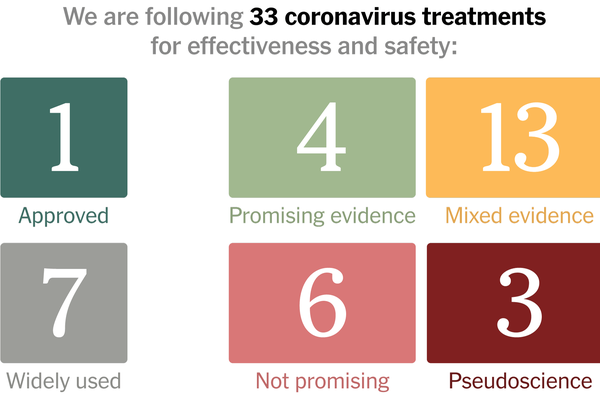
As the world reels from the emergence of the Omicron variant of the coronavirus, a panel of advisers to the Food and Drug Administration is meeting on Tuesday to discuss an antiviral pill from Merck, the first in a new class of treatments that could work against a wide range of variants.
The expert committee will vote on whether to recommend authorizing the drug, known as molnupiravir, for high-risk patients. The treatment — which has been shown to modestly reduce the risk of hospitalization and death, predominantly from the Delta, Mu and Gamma variants — could be authorized in the United States within days, and available soon after, if the committee endorses the drug and the agency follows the recommendation. The panel’s meeting on Tuesday can be watched here.
In the coming weeks, the F.D.A. may also greenlight a similar pill from Pfizer that appears to be significantly more effective than Merck’s.
Health officials around the world have been counting on the new treatments to reduce the number of severe cases and save lives. If Omicron causes a surge in severe infections, it could make them even more important.
Scientists have yet to run experiments to see how well the pills block Omicron viruses from replicating. But there are reasons to think they would remain effective even if the variant can sometimes evade vaccines.

Coronavirus Drug and Treatment Tracker
An updated list of potential treatments for Covid-19.
Omicron has more than 30 mutations on the so-called spike protein that latches on to human cells. Some of those mutations may make it hard for vaccine-produced antibodies to attack the virus.
But the pills do not target the spike protein. Instead, they weaken two proteins involved in the virus’s replication machinery. Omicron carries only one mutation in each of those proteins, and neither looks as if it would stop the pills from doing their jobs.
In a presentation to the committee members, Daria Hazuda, a Merck executive, said molnupiravir’s activity is similar across known variants and that the drug works in a way that makes it likely to be active against new variants.
Virus cases are rising in many regions of the United States, notably the Upper Midwest and Northeast. Nationwide, cases have risen since the start of November, raising fears about a winter surge fueled by the Omicron variant, indoor holiday gatherings and the refusal of tens of millions of Americans to be vaccinated.
In a clinical trial, molnupiravir was found to reduce by 30 percent the risk of hospitalization or death when given to high-risk, unvaccinated volunteers within five days after they started showing symptoms. It appears to be substantially less effective than Pfizer’s pill, which was found to lower risk by 89 percent, and monoclonal antibody treatments, which have been found to cut it by at least 70 percent.
If molnupiravir is authorized in the United States, supply is expected to be limited at first, though it will be more abundant than Pfizer’s pill. The Biden administration has ordered enough courses of treatment, at about $700 per person, for 3.1 million people. Merck is expected to supply those pills before February.
The treatment is given within five days of the start of symptoms and is taken as 40 pills over five days.
The F.D.A. advisory panel, a group of experts on antimicrobial drugs, will vote on whether the treatment should be authorized for people with Covid who are at high risk of becoming severely ill. That would cover tens of millions of Americans who are older or have medical conditions such as obesity, diabetes or heart disease.
The Coronavirus Pandemic: Key Things to Know
The Omicron variant. The latest variant was identified on Nov. 25 by scientists in South Africa, though Dutch officials later said two cases were detected in the Netherlands days earlier. As experts race to learn more, it’s still unclear if the variant leads to severe illness and how effective vaccines will be against it.
The panel is also set to discuss safety concerns that some scientists have raised about Merck’s pill. The treatment works by inserting errors into the virus’s genes. Some scientists say there is a theoretical risk that it could trigger mutations in cells as well, potentially causing reproductive harm or a long-term risk of cancer.
Kerry Blanchard, a Merck senior vice president, presented results from experiments in which pregnant rats were given the drug. Extremely high doses — far above what humans would receive — led to the death of fetuses. “We are not recommending use during pregnancy based on the reproductive findings,” Dr. Blanchard said.
Dr. Blanchard also said that when young rats were given molnupiravir, the drug could temporarily stop the growth of their bones. He cautioned that young rats grow far faster than children, and so it was not clear what the results could mean for humans. Only adults were enrolled in the clinical trials of molnupiravir.
Dr. Nicholas Kartsonis, senior vice president for clinical research, said in his presentation that human trials did not reveal significant serious side effects and that the overall safety profile supported its proposed use in adults.
Dr. Kartsonis spent much of his presentation to the panel describing the interim results from the clinical trial, based on just 775 patients. In that analysis, molnupiravir reduced hospitalization and death by 50 percent. That result led the trial’s safety committee to halt the trial, since the benefit was already clear.
Within the last ten days, the full results from 1,433 volunteers were unblinded, Dr. Kartsonis said. Analyzing the full results, researchers found that the effectiveness dropped to 30 percent.
“As we enter the winter months, another surge is imminent,” Dr. Kartsonis said. “We remain in dire need of novel, effective well tolerated and conveniently administered therapies to treat Covid-19 in the outpatient setting.”
Britain, which authorized Merck’s pill earlier this month, recommended that it not be given to pregnant or breastfeeding women, and that women who could become pregnant use contraception while taking the drug and for four days after. The F.D.A. panel will discuss whether there are some situations in which the drug may be appropriate during pregnancy.
Title: A panel of F.D.A. advisers is meeting about Merck’s Covid pill.
Sourced From: www.nytimes.com/2021/11/30/health/fda-merck-pill-molnupiravir.html
Published Date: Tue, 30 Nov 2021 15:34:06 +0000
Did you miss our previous article...
https://rsssuperfeeds.com/viral-news/supply-chain-problems-have-small-retailers-gambling-on-hoarding






